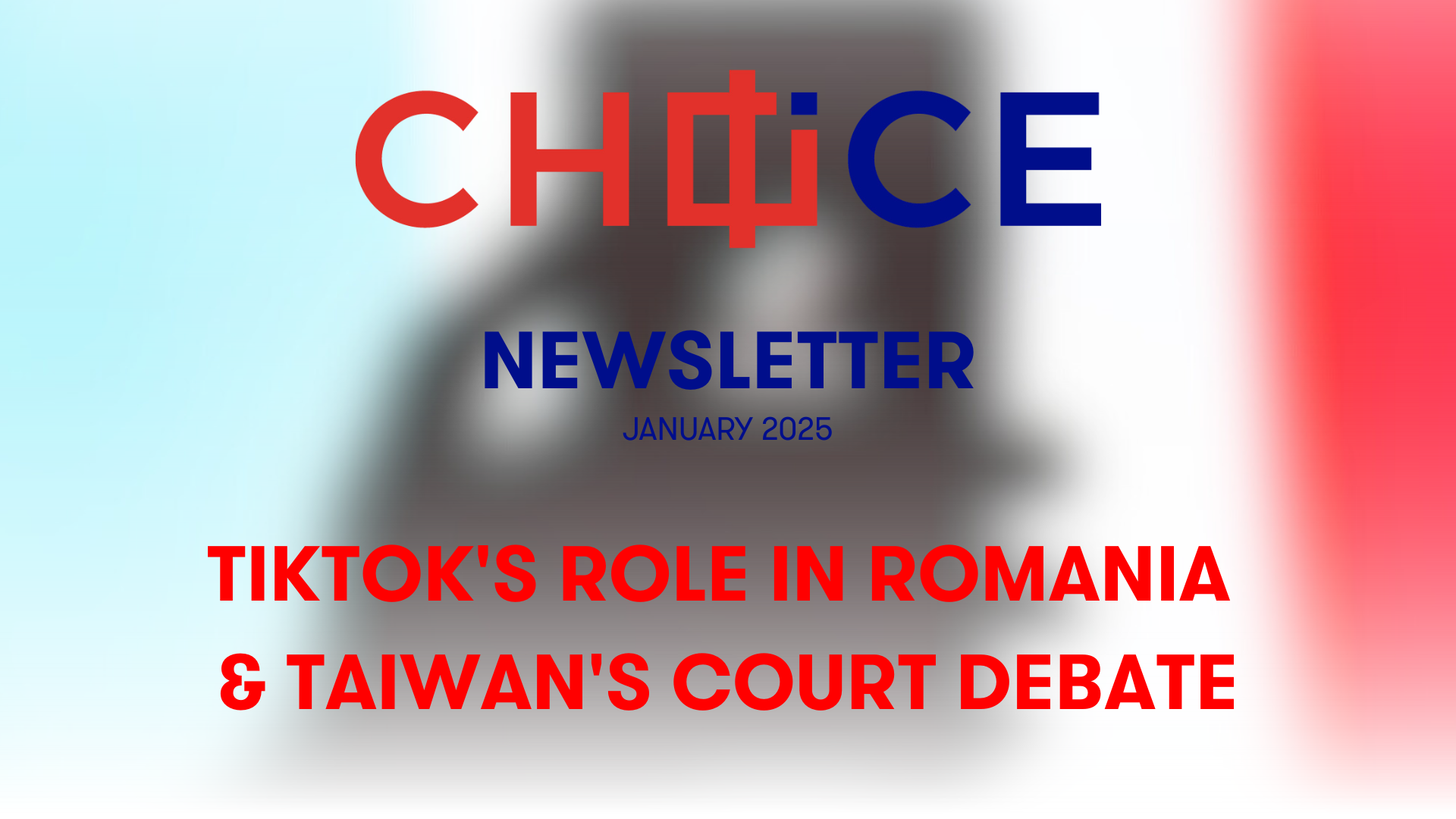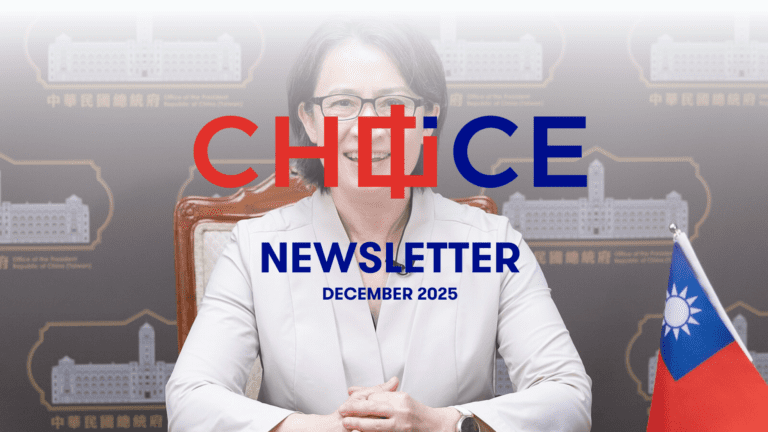CHOICE Newsletter: New Year, New Insights – TikTok’s Role in Romania & Taiwan’s Court Debate

Dear Reader,
As we embark on a new year, we are delighted to bring you the first edition of our newsletter for 2025. In this issue, we delve into the role TikTok played in Romania’s recent presidential election, revolutionizing voter engagement while raising critical questions about digital influence and regulatory challenges. From Eastern Europe, we shift our focus to Taiwan, where a divisive debate over the independence of its Constitutional Court underscores deepening societal and political rifts in one of Asia’s leading democracies.
We are also excited to announce a new collaborative project, “Central and Eastern Europe and the Future of the European China Debate,” spearheaded by CHOICE, OSW, and ECFR and supported by Mercator Stiftung. This initiative seeks to bridge critical gaps in understanding China’s influence in Europe, amplifying the unique perspectives of Central and Eastern Europe (CEE) within the broader European policy conversation.
Wishing you a fantastic start to the year – may it be one filled with growth, inspiration, and meaningful conversations!
CHOICE Take

TikTok and the Romanian Electoral Earthquake
In the recent elections in Romania, TikTok emerged as a game-changing political tool, radically transforming the landscape of voter engagement. Traditionally based on televised debates and print media, campaigns have now moved online on social media, with TikTok becoming the preferred platform for Romanian young voters and a hot spot for far-right messages.
The Romanian presidential race started with 14 candidates, including pro-European contenders like Marcel Ciolacu (center left, current Prime Minister), Elena Lasconi (centrist, currently Mayor), Nicolae Ciucă (rightist – former Prime Minister) and Mircea Geoană (center left, former NATO Deputy Secretary General). However, the spotlight shifted when far-right candidate Călin Georgescu unexpectedly won the first round of the presidential elections.
Georgescu, a 62-year-old engineer with a history in public institutions, is connected to many high-ranking officials, including Mircea Geoană – who has subsequently publicly distanced himself from Georgescu, calling his statements “dangerous and irresponsible.” Georgescu’s family is believed to have had ties to Romanian intelligence services prior to 1989, under the communist regime, as he participated in missions abroad at a time when such endeavors required strict state approval.
In 2020, Călin Georgescu formally entered politics and became a prominent figure in the far-right Alliance for the Union of Romanians (AUR), being nominated — though never appointed — as their candidate for prime minister in 2020 and 2021. However, after a controversial televised statement in which Georgescu praised two fascist leaders who committed crimes against humanity against Jews and Roma in Romania, he left AUR.
Georgescu’s TikTok campaign began in the early summer of 2024, orchestrated via Telegram and amplified initially by paid local influencers and hundreds of fake accounts, featuring short videos of himself promoting nationalist rhetoric, anti-vaccine conspiracies, and rural nostalgia. Despite his impressive online traction on TikTok, Georgescu remained relatively unknown just weeks before the first round of voting. On November 14, 2024, polls showed him at 5.4%, slightly rising to 8.1% by November 22.
The shock came on November 25, when the final results put Georgescu in first place with 22.9% of the votes. Furthermore, Georgescu claimed a zero-budget campaign, attributing his success solely to volunteers, prompting the Permanent Electoral Authority to request an investigation.
One week after, on December 1, the outcome of the parliamentary elections showed similar surprises: three far-right parties managed to secure a combined 35% of parliamentary seats. One of the newcomers POT, supporters of Georgescu, used similar TikTok tactics and reported minimal campaign spending of only 28,000 lei (€5500). Currently there are discussions that, if full financial reports are not submitted, their mandates may not be validated, leaving the seats vacant.
On December 4 President Klaus Iohannis agreed to declassify a report by the Supreme Council of National Defense (CSAT) revealing foreign interference, specifically via TikTok. Days later, based on this new evidence, Romania’s Constitutional Court annulled the first-round results, a historic decision that stirred deep divides and raised fears of growing public distrust. Both Călin Georgescu and his second-round contender Elena Lasconi criticized the decision as undemocratic. New presidential elections are expected to take place in March 2025.
Over 25,000 TikTok accounts were involved in promoting Călin Georgescu, generating millions of views for his videos. This content continued to be posted without the mandatory electoral labels during the official campaign period, a violation of Romanian law. Despite the Central Electoral Bureau’s request for TikTok to remove the material, it remained online, giving him an unfair advantage on the platform. It was later revealed that the operation was carefully orchestrated to promote the pro-Russian, anti-NATO, EU skeptic, anti-capitalist, and nationalist candidate.
As Romania grapples with the fallout, one thing is certain: TikTok’s influence is here to stay, unless countries take action to contain its influence. In 2025, several other countries in Central and Eastern Europe will hold elections – Germany and Czechia among them. Notably, Czech Prime Minister Petr Fiala, despite his government’s previously cautious stance on TikTok, recently decided to open an account on the platform. This pragmatic move signals a shift aimed at engaging younger voters and leveraging TikTok’s vast reach, even as concerns about the platform’s Chinese ownership and potential influence persist.
By Andreea Leonte, CHOICE analyst (based in Bucharest)
Taiwan in Focus
In Taiwan, the Constitutional Court has become a battlefield for the ruling DPP and the opposition KMT.
Ranked Asia’s top democracy, Taiwan has been embroiled in a divisive debate about the independence of its Constitutional Court. Normally composed of 15 judges appointed for eight years by the President, the court currently counts 8 members because new candidates need to be approved by the Legislative Yuan where the opposition KMT party dominates. The KMT is delaying approval, resulting in the court having no President and its lowest number of members since 1947.
But the question has deeper roots and stems from what the KMT perceives as a Constitutional Court power-grab related to two controversial issues: the court’s recent approval of reducing the applicability of the death penalty, which most Taiwanese – and a large majority of KMT supporters – believe should be handled in a referendum. The other issue is the KMT’s failed attempt to increase the investigative power of the Legislative Yuan that was effectively blocked in October by the same court and declared unconstitutional. This particular process led to massive demonstrations in Taiwan in 2024, often called the BlueBird movement (青鳥行動), as an echo of the 2014 Sunflower movement – both opposing closer links with China.
Overall, the debate revolves around the KMT’s increasing focus on altering the institutional balance of power. As the party currently holds a majority in the Legislative Yuan, it has proposed measures to expand legislative authority, including enhancing oversight of the Executive Yuan, which is led by the DPP. These initiatives have raised questions about the party’s approach to democratic checks and balances in Taiwan. For instance, efforts to expand the Legislative Yuan’s investigative powers have been seen by some as potentially blurring the distinction between the Legislative and Control Yuan, contributing to the BlueBird demonstrations. In the end, what is at stake here is Taiwan’s democratic resilience and its ability to strike a fair balance among the three powers that can guarantee a functioning society.
By Filip Noubel, CHOICE Analyst (based in Taipei)
CHOICE News
 Discover the highlights of CHOICE’s impactful year in our Best of CHOICE 2024! From top-read articles to groundbreaking initiatives, explore our top 10 moments shaping China-CEE relations. (read here)
Discover the highlights of CHOICE’s impactful year in our Best of CHOICE 2024! From top-read articles to groundbreaking initiatives, explore our top 10 moments shaping China-CEE relations. (read here)
 Ivana Karásková, CHOICE team lead, explores how Europe’s far-right and
Ivana Karásková, CHOICE team lead, explores how Europe’s far-right and
far-left converge on China in her latest article for The Diplomat, uncovering
the dynamics behind this “marriage of convenience.” (read more on The Diplomat). Explore the insights of our analyst Dominika Remžová in this Radio Free Europe article on the controversies surrounding secret contracts and the accountability of foreign companies in Serbia’s infrastructure projects. (read the full article)
Explore the insights of our analyst Dominika Remžová in this Radio Free Europe article on the controversies surrounding secret contracts and the accountability of foreign companies in Serbia’s infrastructure projects. (read the full article) Ivana Karásková accepted an invitation to Czech Television’s Newsroom to discuss Czech influencers traveling to China and the activities of Raptor TV. (watch it here)
Ivana Karásková accepted an invitation to Czech Television’s Newsroom to discuss Czech influencers traveling to China and the activities of Raptor TV. (watch it here)
 End 2024 on a creative note with CHOICE’s True Color of Xi – an Andy Warhol-inspired anti-stress coloring sheet that invites you to relax and reimagine global politics in bold colors. (download it here)
End 2024 on a creative note with CHOICE’s True Color of Xi – an Andy Warhol-inspired anti-stress coloring sheet that invites you to relax and reimagine global politics in bold colors. (download it here)
 End 2024 on a creative note with CHOICE’s True Color of Xi – an Andy Warhol-inspired anti-stress coloring sheet that invites you to relax and reimagine global politics in bold colors. (download it here)
End 2024 on a creative note with CHOICE’s True Color of Xi – an Andy Warhol-inspired anti-stress coloring sheet that invites you to relax and reimagine global politics in bold colors. (download it here)
 We are on BlueSky! Stay up to date with our latest articles, insights, and news by following our account – don’t miss out on the valuable content and updates we share regularly. (follow us here)
We are on BlueSky! Stay up to date with our latest articles, insights, and news by following our account – don’t miss out on the valuable content and updates we share regularly. (follow us here)
This is the web version of our newsletter. If you’d like to receive the CHOICE newsletter in advance, straight to your inbox, sign up here:
Written by
CHOICE
CHOICE is a multinational consortium of experts providing informed analysis on the rising influence of the People’s Republic of China within the countries of Central and Eastern Europe (CEE).


